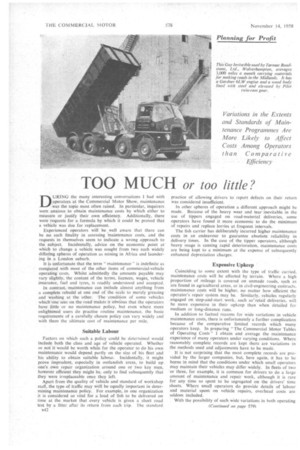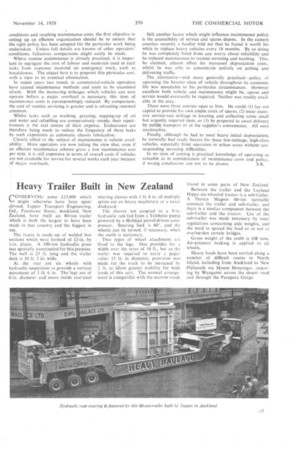TOO MUCH or too little?
Page 76

Page 79

If you've noticed an error in this article please click here to report it so we can fix it.
Variations in the Extents and Standards of Maintenance Programmes Are More Likely to Affect Costs Among Operators than Comparative Efficiency
DURING the many interesting conversations I had with operators at the Commercial Motor Show, maintenance was the topic most often raised. In particular, inquirers were anxious to obtain maintenance costs by which either to measure or justify their own efficiency. Additionally, there were requests for a formula by which it could be proved that a vehicle was due for replacement.
Experienced operators will be well aware that there can be no such finality in assessing 'maintenance costs, and the requests in themselves seem to indicate a wrong approach to the subject. Incidentally, advice on the economic point at• which to change a vehicle was sought from two such widely differing spheres of operation as mining in Africa and laundering in a London suburb.
It is unfortunate that the term " maintenance " is indefinite as compared with most of the other items of commercial-vehicle operating costs. Whilst admittedly the amounts payable may vary slightly, the content of the terms, licences, wages, vehicle insurance, fuel and tyres, is readily understood and accepted.
In contrast, maintenance can include almost anything from a complete rebuild at one end of the scale to merely greasingand washing at the other. The condition of some vehicles which one sees on the road makes it obvious that the operators have little or no maintenance policy, but even where more enlightened users do practise routine maintenance, the basic requirements of a carefully chosen policy can vary widely and with them the ultimate cost of maintenance per mile.
Suitable Labour
Factors on which such a policy could be determined would include both the class and age of vehicle operated. Whether or not it would be worth while for the operator to do his own maintenance would depend partly on the size of his fleet and his ability to obtain suitable labour. Incidentally, it might prove imprudent, especially in outlandish areas, to build up one's own repair organization around one or two key men, however efficient they might be, only to find subsequently that they were irreplaceable once they left.
Apart from the quality of vehicle and standard of workshop staff, the type of traffic may well be equally important in determining maintenance policy. For example, in one organization it is considered so vital for a load of fish to be delivered on time at the market that every vehicle is given a short road test by a fitter after its return from each trip. The standard e42 practice of allowing drivers to report defects on their return was considered insufficient.
In other spheres of operation a different approach might be made. Because of the heavy wear and tearinevitable in the use of tippers engaged on road-material deliveries, some operators have found it more economic to do the minimum of repairs and replace lorries at frequent intervals.
The fish carrier has deliberately incurred higher maintenance costs in an endeavour to guarantee absolute reliability in delivery times. In the case of the tipper operators, although heavy usage is causing rapid deterioration, maintenance costs are being kept to a minimum at the expense of subsequently enhanced depreciation charges.
Expensive Upkeep •
Coinciding to some extent with the type of traffic carried, maintenance costs will be affected by terrain. Where a high proportion of mileage is covered on unmade roads, such as 'are found in agricultural areas, or in civil-engineering contracts, maintenance costs will be higher, no matter how efficient the operator's repair system may be. Similarly, vehicles regularly .engaged on. stop-and-start work, such aeretail deliveries, will be more expensive in their upkeep than when detailed for medium or long-distance runs.
In addition to factual reasons for wide variations in vehicle maintenance costs, there is unfortunately a further complication because of the comparative limited records which many operators keep. In preparing "The Commercial Motor Tables of Operating Costs" I obtain and average the maintenance experience of many operators under varying conditions. Where reasonably complete records are kept there are variations in the methods used and adjustments have to be made.
It is not surprising that the most complete records are provided by the larger companies, but, here again, it has to be borne in mind that the conditions under which small operators may maintain their vehicles may differ widely. In fleets of two or three, for example, it is common for drivers to do a large amount of maintenance and repair work, although it is rare for any time so spent to be segregated on the drivers' time sheets. Where small operators do provide details of labour and material spent on vehicle repairs, overhead costs are seldom included.
With the possibility of such wide variations in both operating (Continued on page 5791 conditions and resulting maintenance costs, the first objective in setting up an efficient Organization should be to ensure that the right policy has been adopted for the particular work being undertaken. Unless full details are known of other operators' conditions, fallacious comparisons might easily be made.
Where routine maintenance is already practised, it is important to segregate the cost of labour and materials use.d in such tasks from expenses incurred on emergency work, such as breakdowns. The object here is to pinpoint this particular cost, with a view to its eventual elimination.
In recent years two trends in commercial-vehicle operation have caused maintenance methods and costs to be examined afresh. With the increasing mileages which .vehicles can now operate before a major overhaul is necessary, this item of maintenance costs is correspondingly reduced. By comparison, the cost of routine servicing is greater and is attracting renewed attention.
Whilst tasks such as washing. greasing, topping-up of oil and water and refuelling are comparatively simple, their repetitiveness is the real source of their expense. Endeavours are therefore being made to reduce the frequency of these tasks by such expedients as automatic chassis lubrication.
Closely allied to the subject of maintenance is vehicle availability: More operators are now taking the view that, even if an efficient maintenance scheme gives a low maintenance cost per mile, it is still expensive in terms of overall costs if vehicles are not available for service for several weeks each year because of major overhauls. Still another factor which might influence maintenance policy is the accessibility of service and spares depots. In the eastern counties recently a haulier told me that he found it worth his while to replace heavy vehicles every 18 months. By so doing he was completely freed from any worry about reliability and he reduced maintenance to routine servicing and washing. This, he claimed, almost offset his increased .depreciation costs. whilst he was able to concentrate entirely on getting and delivering traffic.
The alternative—and more generally practised—policy of operating the heavier class of vehicle throughout its economic life was unsuitable to his particular circumstances. However excellent both vehicle and. maintenance might be, spares and service would eventually be required. Neither was readily available in his area.
There were three courses open to him. He could (1) lay out capital to provide his own ample stock of spares, (2) incur excessive service-van mileage in locating and collecting some small but urgently required item, or (3) be prepared to await delivery by public transport or at the supplier's convenience. All were unattractive.
Finally, although he had to meet heavy initial depreciation, he naturally had ready buyers for these low-mileage, high-class vehicles, especially from operators in urban areas without corresponding servicing difficulties.
In no item of costing is practical knowledge of operating so valuable as in consideration of maintenance costs and policy, if wrong conclusions are not to be drawn. S.B.




















































































































